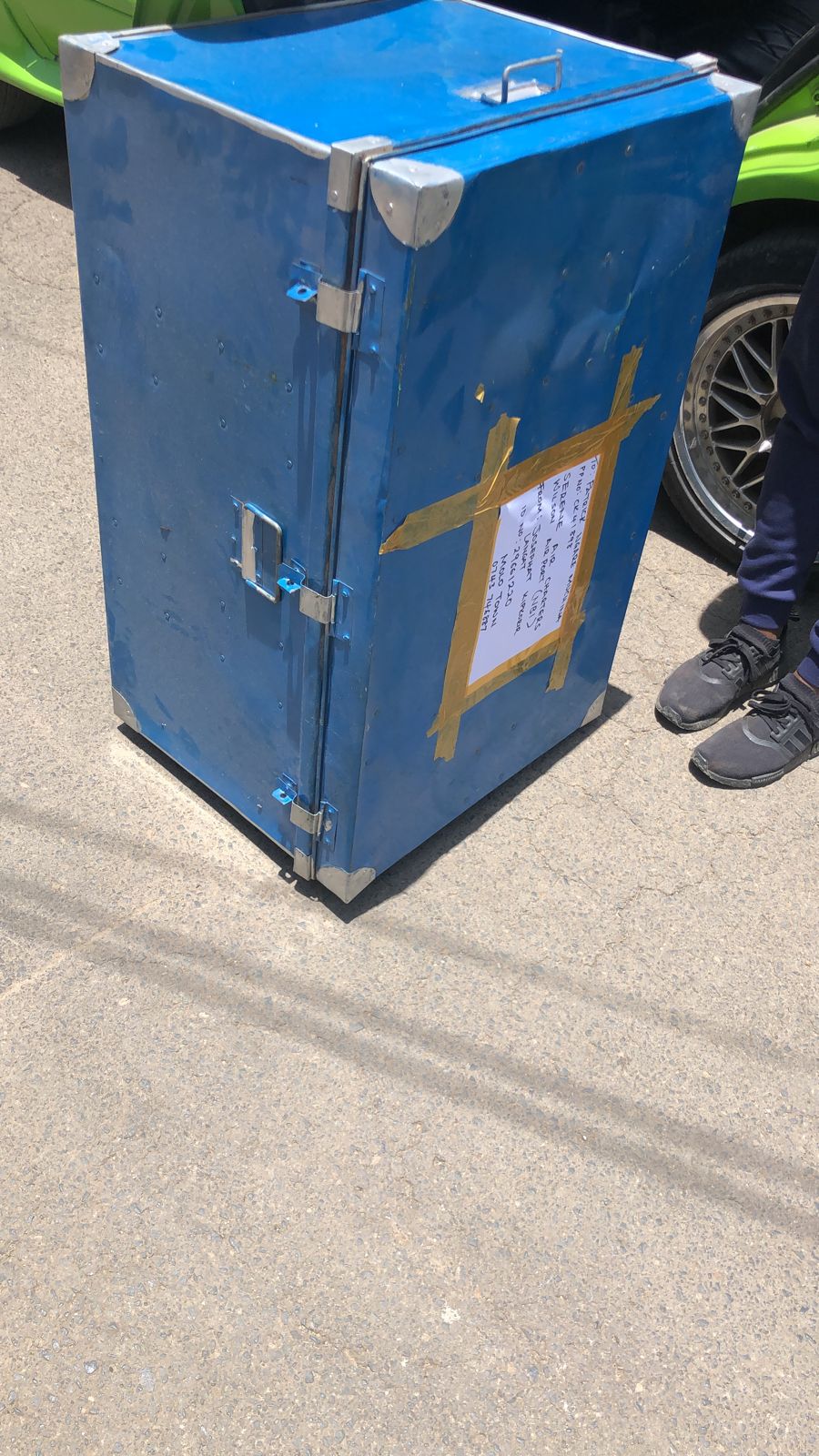Detectives in Nairobi have launched a manhunt for a Nairobi businessman by the name of Patrick Ngare Muchina after a consignment of suspected elephant tasks valued at around Sh11 million was intercepted at the Wilson Airport.
The ivory that originated from Molo, had been packed in a steel box and addressed to Patrick Ngare Muchina, Passport number CK41898, Serene Air Charters, Wilson Airport, Nairobi. The parcel originated from a Mr Josephat Kipkorir Langat of ID Number 29661220 and mobile number 0743746887 in Molo Town.
Kenya Wildlife Service (KWS) were, however, yet to verify is the consignment was real Ivory.
Muchina who had a warrant of arrest issued against him together Kelvin Maura Ngotho and James Nganga in November 2020, for being suspects in a fake gold racket, is believed to be having links to clearing and forwarding firm Serene Air Charters that also works in air travel business activities, which has it’s main office at Wilson Airport where the parcel was intended to be delivered.
He is believed to be a close friend of former Nairobi RCIO Bernard Nyakwaka who has since been moved to the Jomo Kenyatta International Airport and named the head of the DCI Kenya Airports Police Unit where he replaced Joseph Mugwanja who was transferred to DCI Headquarters and named the director of planning.
Detectives who had received a tip off about the illicit trade, laid a trap near the premises the better part of today, waiting for the ivory to be delivered and the delivery was done at around 1pm with white probox. It is, however, not clear how many occupants of the car were reprimanded in the ambush.
The detectives on the ground refused to comment on the issue, claiming that it would jeoperdise investigations.
Illegal hunting still continues in the country, despite the fact that elephant hunting and the ivory trade, which used to be an accepted activity in Kenya, was banned in 1973. This is because there still international demand for elephant tusks.
Wildlife authorities in Kenya in 2014 confirmed that a high demand for ivory in Asian countries, especially China, had triggered an increase in illegal smuggling and poaching of elephants.
But the authorities are optimistic that the -enacted anti-poaching laws that allow courts to impose stiff sentences on convicted elephant poachers, will in the foreseeable future stop the slaughter of the animal.
‘You can see, the laws are tough. Offenders are likely to feel the full impact of the anti-poaching laws. Without doubt, hefty fines imposed by courts on poachers and smugglers will deter them from killing the elephant,” Paul Udoto, official spokesman for the Kenya Wildlife Service that conserves wildlife in the country, told Anadolu Agency (AA) in an a past interview.
Muchina who had a warrant of arrest issued against him together Kelvin Maura Ngotho and James Nganga in November 2020, for being suspects in a fake gold racket, is believed to be having links to clearing and forwarding firm Serene Air Charters that also works in air travel business activities, which has it’s main office at Wilson Airport where the parcel was intended to be delivered.
He is believed to be a close friend of former Nairobi RCIO Bernard Nyakwaka who has since been moved to the Jomo Kenyatta International Airport and named the head of the DCI Kenya Airports Police Unit where he replaced Joseph Mugwanja who was transferred to DCI Headquarters and named the director of planning.
Detectives who had received a tip off about the illicit trade, laid a trap near the premises the whole day yesterday, waiting for the ivory to be delivered and the delivery was done at around 1pm with white probox. It is, however, not clear how many occupants of the car were reprimanded in the ambush.
The detectives on the ground refused to comment on the issue, claiming that it would jeoperdise investigations.
Illegal hunting still continues in the country, despite the fact that elephant hunting and the ivory trade, which used to be an accepted activity in Kenya, was banned in 1973. This is because there still international demand for elephant tusks.
Wildlife authorities in Kenya in 2014 confirmed that a high demand for ivory in Asian countries, especially China, had triggered an increase in illegal smuggling and poaching of elephants.
But the authorities are optimistic that the -enacted anti-poaching laws that allow courts to impose stiff sentences on convicted elephant poachers, will in the foreseeable future stop the slaughter of the animal.
‘You can see, the laws are tough. Offenders are likely to feel the full impact of the anti-poaching laws. Without doubt, hefty fines imposed by courts on poachers and smugglers will deter them from killing the elephant,” Paul Udoto, official spokesman for the Kenya Wildlife Service that conserves wildlife in the country, told Anadolu Agency (AA) in an a past interview.


